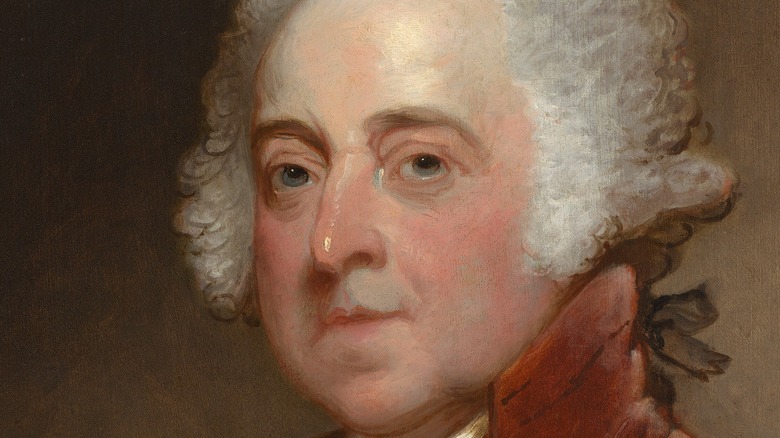The Reason John Adams Once Pardoned A Man For Treason
President John Adams probably surprised many when he spared the life of John Fries, who had been convicted of treason and sentenced to hang. Some even say that the pardon of Fries and all those involved in his rebellion may have cost Adams his bid for reelection.
Fries was part of a group of farmers protesting a tax on their lands, buildings, and slaves in what became known as Fries' Rebellion (via Britannica). The son of a German immigrant, Fries was a Revolutionary War veteran and an auctioneer, per West Rockhill Historical Society. As a soldier, Fries helped quell the Whiskey Rebellion, which started in 1791 and ended in 1794. In this earlier uprising, Pennsylvania farmers took a stand against a new tax on spirits.
Flash forward to 1798, when the federal government sought to raise funds for a potential war with France. President Adams wanted to build up the military in case war broke out, and he was able to get Congress to pass the House Tax Law, which taxed property and buildings (via the Philadelphia Encyclopedia). Some residents of Northampton, Montgomery, and Bucks counties tried to resist the new tax by threatening and chasing away tax assessors from their lands. The following January the federal government called for the arrest of rebels who prevented the assessors from doing their jobs.
Fries led armed men to free arrested tax resisters
In March 1799, U.S. Marshal William Nichols arrived in Northampton County, where he rounded up the resisters and took them into custody in a temporary jail at the Sun Inn in Bethlehem, Pennsylvania (via the Philadelphia Encyclopedia). Four hundred armed men, led by John Fries, approached the inn in an effort to free the imprisoned tax resisters. As the standoff dragged on, Nichols ultimately agreed to release the insurrectionists, but not before President Adams released military forces in response to the rebellion.
Fries and 30 others were arrested, and he was put on trial for treason. In his trial, Fries was convicted and sentenced to hang, but it was later ruled a mistrial. In April 1800, Fries was again tried for treason. The jury reached the same conclusion as the first one, and Fries once again faced the hangman's noose.
In a miraculous twist of fate, Fries' life was spared in May when President Adams decided to pardon all those involved in the rebellion. In his proclamation, Adams said that "having speedily suppressed without any of calamities usually attending rebellion" and with "the ignorant, misguided, and misformed" rebels returned to their "proper sense of their duty," it was "unnecessary for the public good that any future prosecutions should be commenced or carried on against any person or persons” involved in the insurrection" (via the Miller Center). With one announcement from Adams, Fries became a free man and returned to his work as an auctioneer (via the West Rockhill Historical Society).

